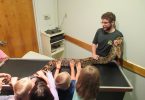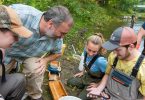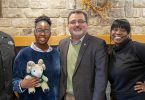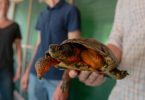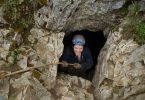Security: Coordinating Borders and Wildlife/Protected Lands
Jonathan Andrew recalls he wasn’t sure what he wanted to do when he got out of high school.
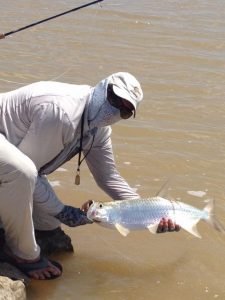 Growing up in Framingham, Mass., “I was not a very engaged high school student,” he said. “I liked to go fishing and birding, but I didn’t know what I wanted to do, so I worked on a loading dock for a year. After that, I knew I didn’t want to load and unload trucks my whole life. I didn’t know whether my love of the outdoors could be something that could lead to a career,” he said. “Once I got into Unity, a light went on, and I was just grateful and excited to be there.”
Growing up in Framingham, Mass., “I was not a very engaged high school student,” he said. “I liked to go fishing and birding, but I didn’t know what I wanted to do, so I worked on a loading dock for a year. After that, I knew I didn’t want to load and unload trucks my whole life. I didn’t know whether my love of the outdoors could be something that could lead to a career,” he said. “Once I got into Unity, a light went on, and I was just grateful and excited to be there.”
Today, Andrew is the Interagency Borderlands Coordinator for the U.S. Department of Interior in Washington, D.C., where he coordinates activities among all of Interior’s agencies.
“The job was created when the U.S. Border Patrol greatly expanded its presence in the Southwest,” he said. In less than 10 years, the ranks of border patrol agents had swelled from 5,000 to now, approximately 20,000.
“In that part of the world,” he said, “We had to find a way to manage the border security activities in such a way that they would not have significant impacts on National Parks and National Wildlife Refuges. Along the Southwest border, there are many endangered species such as Mexican long-nosed bats and Sonoran pronghorn antelope.”
“Agencies like the U.S. Border Patrol have gotten a lot better about environmental compliance as a result of working with us at Interior.”
Andrew attended Unity College from 1974 to 1978 and graduated with a B.S. in Environmental Science. Hearing him talk about his daily dose of dealing at a federal level with clashing constituencies to arrive at environmental solutions, it sounds as if he has been taking recent classes at America’s Environmental College — with its adoption of the interdisciplinary framework of sustainability science.
“As the years go by, I often reflect on how important those four years were. Had I gone to a different school, I would have had a very different experience. When I went to Unity, I really felt like I got solid basic schooling in environmental science and zoology that really helped when I went on to graduate school. Later, when I began my career in the real world, I learned you always have to figure out how to work with people, you need to compromise and negotiate.”
“Looking back, I have to say Unity College provided me with a great foundation and allowed me to grow into the steps I took later in my career, building confidence that I could take on the next challenge even when I wasn’t sure what I was getting into.”
Andrew recalls a lot of what transpired on campus after nearly four decades.
“Dr. Charlie Rabeni was important to me,” he said. “I had a job on campus trying to make a little money plowing snow and taking stuff to the dump. He said, ‘Why are you doing that? You won’t be doing that when you graduate.’ So I started working for him on aquatic entomology projects. He pulled me in a new direction. Dave Knupp helped me as well – he pushed me in the right direction, too,” he said. “And, of course, Dot Quimby in the library. Dave Purdy, Reverend Fowler, John Sanborn, so many of the faculty and staff were influential in some way. “
In the next few months, Andrew will travel to Cabeza Prieta National Wildlife Refuge in Arizona, to work with the U.S. Border Patrol and the U.S. Fish and Wildlife Service to address impacts of illegal immigration and smuggling.
Thank you, Jonathan, for taking on important and complex tasks!

